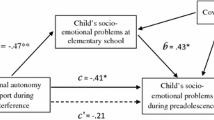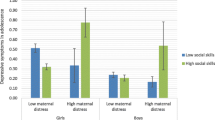Abstract
The current study examined the links between maternal life stress and subsequent toddler behavior problems and social competence, as well as the potential moderating effects of cool and hot inhibitory control (IC) in mainland China. Participants included 89 mothers and their infants (42 boys, 47 girls). Mothers completed self-report measure of maternal life stress when their children were 1 year of age (M = 1.18, SD = .07 at Time 1), and reported on their children’s social adjustment using the Chinese version of Infant-Toddler Social and Emotional Assessment (CITSEA) at Time 1 and again a year later (M = 2.06, SD = .09 at Time 2). Toddler IC was assessed with laboratory tasks at Time 2. Structural equation modeling with a bootstrap resample of 1000 indicated that cool IC significantly moderated the longitudinal association between maternal life stress (T1) and latent construct of toddler behavior problems (T2), controlling for behavior problems at Time 1, child age and maternal age. Specifically, maternal life stress was associated with subsequent behavior problems only for toddlers who were low in cool IC. In comparison to the results of behavior problems, high levels of maternal life stress predicted subsequent low levels of social competence. Neither cool IC nor hot IC served as the moderator in the association between maternal life stress (T1) and toddler social competence (T2). These findings indicated that toddler cool IC may promote resilient adaptation and modify the links between maternal life stress and toddler behavior problems but not social competence.



Similar content being viewed by others
References
Agnafors, S., Comasco, E., Bladh, M., Sydsjö, G., DeKeyser, L., Oreland, L., & Svedin, C. G. (2013). Effect of gene, environment and maternal depressive symptoms on pre-adolescence behavior problems–a longitudinal study. Child and Adolescent Psychiatry and Mental Health, 7(1), 1–9.
Archer, M., Steele, M., Lan, J., Jin, X., Herreros, F., & Steele, H. (2015). Attachment between infants and mothers in China strange situation procedure findings to date and a new sample. International Journal of Behavioral Development, 39(6), 485–491.
Beijers, R., Riksen-Walraven, M., Putnam, S., de Jong, M., & de Weerth, C. (2013). Early non-parental care and toddler behaviour problems: Links with temperamental negative affectivity and inhibitory control. Early Childhood Research Quarterly, 28(4), 714–722.
Carlson, S. M., Mandell, D. J., & Williams, L. (2004). Executive function and theory of mind: Stability and prediction from ages 2 to 3. Developmental Psychology, 40(6), 1105–1122.
Carter, A. S., Briggs-Gowan, M. J., Jones, S. M., & Little, T. D. (2003). The infant–toddler social and emotional assessment (ITSEA): Factor structure, reliability, and validity. Journal of Abnormal Child Psychology, 31(5), 495–514.
Cummings, E. M., Davies, P. T., & Campbell, S. B. (2002). Developmental psychopathology and family process: Theory, research, and clinical implications. New York, NY: The Guilford 135.
Davis, T. A., Carr, E. R., Hickman, E., Rosenberg, A., & Kaslow, N. J. (2014). Posttraumatic stress disorder, alcohol use, and life stress among African-American women. Mental Health and Substance Use, 7(4), 286–298.
Diamond, A. (2013). Executive functions. Annual Review of Psychology, 64, 135–138.
Di Norcia, A., Pecora, G., Bombi, A. S., Baumgartner, E., & Laghi, F. (2015). Hot and cool inhibitory control in italian toddlers: Associations with social competence and behavioral problems. Journal of Child and Family Studies, 24(4), 909–914.
Gagne, J. R., Saudino, K. J., & Asherson, P. (2011). The genetic etiology of inhibitory control and behavior problems at 24 months of age. Journal of Child Psychology and Psychiatry, 52(11), 1155–1163.
Godoy, L., Mian, N. D., Eisenhower, A. S., & Carter, A. S. (2014). Pathways to service receipt: Modeling parent help-seeking for childhood mental health problems. Administration and Policy in Mental Health and Mental Health Services Research, 41(4), 469–479.
Hughes, C., & Ensor, R. (2008). Does executive function matter for preschoolers’ problem behaviors? Journal of Abnormal Child Psychology, 36(1), 1–14.
Kertz, S. J., Belden, A. C., Tillman, R., & Luby, J. (2016). Cognitive control deficits in shifting and inhibition in preschool age children are associated with increased depression and anxiety over 7.5 years of development. Journal of Abnormal Child Psychology, 44(6), 1185–1196.
Kim, S., Nordling, J. K., Yoon, J. E., Boldt, L. J., & Kochanska, G. (2013). Effortful control in “hot” and “cool” tasks differentially predicts children’s behavior problems and academic performance. Journal of Abnormal Child Psychology, 41(1), 43–56.
Kochanska, G., Murray, K. T., & Harlan, E. T. (2000). Effortful control in early childhood: continuity and change, antecedents, and implications for social development. Developmental Psychology, 36(2), 220–232.
Kochel, K. P., Ladd, G. W., & Rudolph, K. D. (2012). Longitudinal associations among youth depressive symptoms, peer victimization, and low peer acceptance: An interpersonal process perspective. Child Development, 83(2), 637–650.
Lee, K. (2003). Maternal coping skills as a moderator between depression and stressful life events: Effects on children’s behavioral problems in an intervention program. Journal of Child and Family Studies, 12(4), 425–437.
Lengua, L. J., Bush, N. R., Long, A. C., Kovacs, E. A., & Trancik, A. M. (2008). Effortful control as a moderator of the relation between contextual risk factors and growth in adjustment problems. Development and Psychopathology, 20(2), 509–528.
Lerner, R. M. (2002). Concepts and theories of human development (3rd ed.) Mahwah, NJ: Lawrence Erlbaum Associates.
Metsäpelto, R. L., Pakarinen, E., Kiuru, N., Poikkeus, A. M., Lerkkanen, M. K., & Nurmi, J. E. (2015). Developmental dynamics between children’s externalizing problems, task-avoidant behavior, and academic performance in early school years: A 4-year follow-up. Journal of Educational Psychology, 107(1), 246–257.
Muthén, L. K., & Muthén, B. O. (1998–2015). Mplus user’s guide (7th ed). Los Angeles, CA: Muthén & Muthén.
Pratt, M., Goldstein, A., Levy, J., & Feldman, R. (2017). Maternal depression across the first years of life impacts the neural basis of empathy in preadolescence. Journal of the American Academy of Child & Adolescent Psychiatry, 56(1), 20–29.
Preacher, K. J., Curran, P. J., & Bauer, D. J. (2006). Computational tools for probing interaction effects in multiple linear regression, multilevel modeling, and latent curve analysis. Journal of Educational and Behavioral Statistics, 31(4), 437–448.
Reuben, J. D., Shaw, D. S., Neiderhiser, J. M., Natsuaki, M. N., Reiss, D., & Leve, L. D. (2016). Warm parenting and effortful control in toddlerhood: independent and interactive predictors of school-age externalizing behavior. Journal of Abnormal Child Psychology, 44(6), 1083–1096.
Rhoades, B. L., Greenberg, M. T., & Domitrovich, C. E. (2009). The contribution of inhibitory control to preschoolers’ social–emotional competence. Journal of Applied Developmental Psychology, 30(3), 310–320.
Schmidt, M., Demulder, E., & Denham, S. (2002). Kindergarten social-emotional competence: Developmental predictors and psychosocial implications. Early Child Development and Care, 172(5), 451–462.
Smith, E. N., Grau, J. M., Duran, P. A., & Castellanos, P. (2013). Maternal depressive symptoms and child behavior problems among Latina adolescent mothers: The buffering effect of mother-reported partner child care involvement. Merrill-Palmer Quarterly, 59(3), 1–22.
Spinrad, T. L., Eisenberg, N., Gaertner, B., Popp, T., Smith, C. L., Kupfer, A., & Hofer, C. (2007). Relations of maternal socialization and toddlers’ effortful control to children’s adjustment and social competence. Developmental Psychology, 43(5), 1170–1186.
Su, C., & Hynie, M. (2011). Effects of life stress, social support, and cultural norms on parenting styles among mainland Chinese, European Canadian, and Chinese Canadian immigrant mothers. Journal of Cross-Cultural Psychology, 42(6), 944–962.
Tan, T. X., Gelley, C. D., & Dedrick, R. F. (2015). Non-child-related family stress, parenting styles, and behavior problems in school-age girls adopted from China. Journal of Child and Family Studies, 24(10), 2881–2891.
Thomas, A. G., Monahan, K. C., Lukowski, A. F., & Cauffman, E. (2015). Sleep problems across development: A pathway to adolescent risk taking through working memory. Journal of Youth and Adolescence, 44(2), 447–464.
Uliaszek, A. A., Zinbarg, R. E., Mineka, S., Craske, M. G., Griffith, J. W., Sutton, J. M., & Hammen, C. (2012). A longitudinal examination of stress generation in depressive and anxiety disorders. Journal of Abnormal Psychology, 121(1), 4–15.
Utendale, W. T., & Hastings, P. D. (2011). Developmental changes in the relations between inhibitory control and externalizing problems during early childhood. Infant and Child Development, 20(2), 181–193.
Utendale, W. T., Nuselovici, J., Saint-Pierre, A. B., Hubert, M., Chochol, C., & Hastings, P. D. (2014). Associations between inhibitory control, respiratory sinus arrhythmia, and externalizing problems in early childhood. Developmental Psychobiology, 56(4), 686–699.
Van Aken, C., Junger, M., Verhoeven, M., Van Aken, M. A. G., & Deković, M. (2007). The interactive effects of temperament and maternal parenting on toddlers’ externalizing behaviours. Infant and Child Development, 16(5), 553–572.
Van Rijn, S., Aleman, A., de Sonneville, L., Sprong, M., Ziermans, T., Schothorst, P., & Swaab, H. (2011). Misattribution of facial expressions of emotion in adolescents at increased risk of psychosis: the role of inhibitory control. Psychological Medicine, 41(3), 499–508.
Van Zeijl, J., Mesman, J., Stolk, M. N., Alink, L. R., Van IJzendoorn, M. H., Bakermans-Kranenburg, M. J., & Koot, H. M. (2006). Terrible ones? Assessment of externalizing behaviors in infancy with the Child behavior checklist. Journal of Child Psychology and Psychiatry, 47(8), 801–810.
Wong, M. M., Brower, K. J., Nigg, J. T., & Zucker, R. A. (2010). Childhood sleep problems, response inhibition, and alcohol and drug outcomes in adolescence and young adulthood. Alcoholism: Clinical and Experimental Research, 34(6), 1033–1044.
Xie, R., & Awokuse, T. O. (2014). Is Maternal Employment Related to Childhood Obesity in China?: Evidence from the China Health and Nutrition Survey. In 2014 Annual Meeting, July 27–29, 2014, Minneapolis, Minnesota (No. 170477). Agricultural and Applied Economics Association.
Yaman, A., Mesman, J., van IJzendoorn, M. H., & Bakermans-Kranenburg, M. J. (2010). Perceived family stress, parenting efficacy, and child externalizing behaviors in second-generation immigrant mothers. Social Psychiatry and Psychiatric Epidemiology, 45(4), 505–512.
Yang, D. S., & Zhang, Y. L. (1990). Life event scale. In D. S. Yang (Ed.), Behavioral medicine (p. 285). Changsha, China: Hunan Normal University.
Yi, C. Y., Gentzler, A. L., Ramsey, M. A., & Root, A. E. (2016). Linking maternal socialization of positive emotions to children’s behavioral problems: The moderating role of self-control. Journal of Child and Family Studies, 25(5), 1550–1558.
Zelazo, P. D., & Carlson, S. M. (2012). Hot and cool executive function in childhood and adolescence: Development and plasticity. Child Development Perspectives, 6(4), 354–360.
Zhang, J. D., Wang, H. S., Shi, S. H., Huang, X. N., Liu, G. Y., Lian, G. B., & Shi, J. X. (2009). Reliability and validity of standardized Chinese version of urban infant–toddler social and emotional assessment. Early Human Development, 85(5), 331–336.
Zhu, P., Huang, W., Hao, J. H., Huang, K., Jiang, X. M., & Tao, F. B. (2013). Time-specific effect of prenatal stressful life events on gestational weight gain. International Journal of Gynecology & Obstetrics, 122(3), 207–211.
Acknowledgements
This study was funded by National Natural Science Foundation of China (No. 31470994 and NO.31400894). We want to thank the families who participated in our longitudinal study, and the reviewer who provided valuable suggestions that improved this manuscript.
Author information
Authors and Affiliations
Corresponding author
Ethics declarations
Conflict of Interest
The authors declare that they have no competing interests.
Informed Consent
Informed consent was obtained from parents.
Additional information
Nan Zhou and Siman Liu contributed equally to this work.
Rights and permissions
About this article
Cite this article
Liu, S., Zhou, N., Wang, Z. et al. Maternal Life Stress and Subsequent Chinese Toddlers’ Social Adjustment: The Moderating Role of Inhibitory Control. J Child Fam Stud 27, 412–420 (2018). https://doi.org/10.1007/s10826-017-0887-1
Published:
Issue Date:
DOI: https://doi.org/10.1007/s10826-017-0887-1




